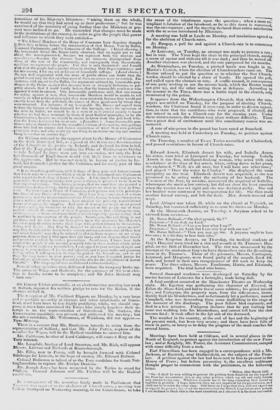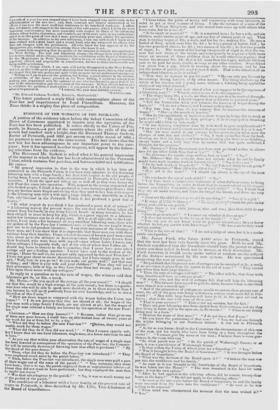Meetings have been held at Oldham, and in several places
in the ' North of England, to protest against the introduction of the new Poor. law ; and at Keightly, Mr. Power, the Assistant Commissioner, escaped with some difficulty from a tnob. Earl Eitzwilliam has been engaged in a correspondence with a Mr. Jackson, ot Rustrick, near Huddersfield, on the subject of the Poor. law. A petition against the law had been sent to him to present to the House of Peers; but hefbre presenting it, the excellent nobleman thought proper to remonstrate with the petitioners, in the following letter.
" Milton, 16th March 1837. " Sir-1 shall be very willing to present the petition from Ilastrick fur die repeal of the Poorlaw Amendment Act, or tiny oiler petition whieli my mid and early trieuds may intrust to my care. Whatever reminds me oh the long connexion that hound us together is grateful. I hope, however, tliey are n44 impatient for its presentation, as I shall not he to toWto fur some time. still more do I hope timid they will not eXpeet me to support its prayer; iii-, of umtl the nieustites that the British Legislature ever passed, am inclined to thick this is the must beneficial, as I 7.11111SURI it is the must successful. tpwards of a year has now elapsed since I have been engaged very assioltemsly in the adminiatration of the new law ; and, from constant awl minute observatiou of its effects, 1 can hear the most conflolent testimony to its beneficial tendency. I affirm this. not merely with respect to the interests of the rate-payers, which I deem the least important consideration, but more especially with respect to those of the labouring classes, whose habits, characters, and comforts are of fat more value in my estimation ; and it is in this point of view that I more particularly prize and admire the operation of the measure. In addition to my own testimony. I can say with truth I know of no man, endued with a kind heart and a sound head, who has witnessed its effects, who does not disagree with the petitioners. All who know the law approve of it; the disapprovers are, without exception, among those who know it not. "I cannot help suspecting that the genius of the measure is entirely misconceived ia the Welte The real and important change, the chauge from winie the new law derives almost all its efficacy, consists in the sebstitution of the Board of Guardians for the Magistrates in Petty Sessions ; that is to say, or a holy of representatives. popularly elected and responsible to coustituents, for two or three irremoveable and nrespensible gentlemen. "This is a change which, I am sure, will not be disapproved io the West Riding; and yet, as this is the great practical alteration that has been made, this is what makes me suspect that the very genius and spirit of the measure are miounderstoud amung yurn n‘ Willing as I am to present the petition. hurt feeling a great interest in the wisdom, or otherwise, of the course pursued in the West Riding. I could we refrain Irons nicking you acquainted with the opinions of one who has devoted a great deal of Ids time to the administratiun and observation of the measure. lithey shooed induce on to withdraw the petition. I shall rejoice ; if your persist in it, I sit .11 still hope to be allowed to present it. " I remain, Sir, your most faithful servant. " FITZ WILLIAM.
" Mr. Eda ard Jackson, Toothill, Bastriek, Huddersfield."
This letter produced a reply filled with commonplace abuse of the Poomlaw and impertinence to Lord Fitzwilliam. However, the
Times thinks it a mighty fine piece of composition.



























 Previous page
Previous page